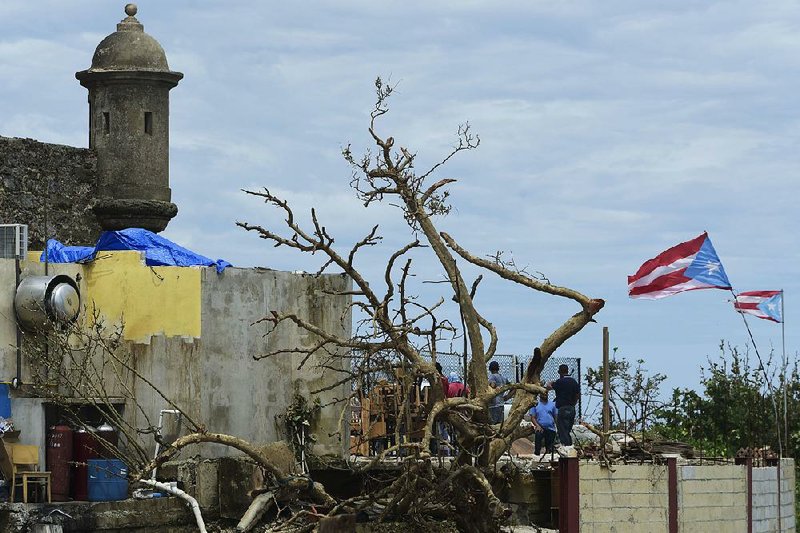SAN JUAN, Puerto Rico -- A nursing home in San Juan made desperate pleas for diesel fuel as its power generator ran low. An elderly man was carried out on a stretcher after going a week without dialysis. Children wearing nothing but diapers camped out on balconies to stay cool.
This is Puerto Rico's hottest time of the year, and next to nobody has air conditioning. Hurricane Maria, which smashed into the island last week and devastated the power grid run by Puerto Rico Electric Power Authority, couldn't have struck at a worse time. Crews have descended upon the island to begin the task of resurrecting what was an already aging and long-neglected system. But that'll take weeks, if not months -- meaning more sleepless nights for those like Juan Bautista Gonzalez.
"It's brutal," said Gonzalez, a 36-year-old carpenter who was sitting on a stoop in Old San Juan and rubbing his forehead in frustration. "No one can sleep. I spend all night tossing and turning. This is chaos."
The destruction that Maria exacted on Puerto Rico's fragile electricity system when it slammed ashore as a Category 4 storm is unprecedented, not just for the island but also for all of the U.S. Every part of the grid run by the electric authority was damaged.
Click here for larger versions
Photos by The Associated Press
Photos by The Associated Press
In the 32 years that National Guard Brig. Gen. Wendul Hagler II has served, he said, "It's about as large a scale damage as I have ever seen." Hagler had visited the U.S. Virgin Islands just before Maria hit.
For an indication of how long it will take for Puerto Rico to rebuild the system, Gov. Ricardo Rossello points to Hurricane Hugo, a powerful storm that ravaged the region in 1989. Some had electricity within two months of Hugo. Others spent six months waiting. "It's a gradual thing," Rossello told reporters on Sunday. "You have to be careful not to alarm people."
The lack of phone and Internet access isn't helping. Puerto Ricans pulled over along highways over the weekend to take advantage of the rare spots where cellular service was available. They called into the few radio stations still working in an attempt to connect with relatives.
To make matters worse, many of Puerto Rico's power plants are clustered along the island's south coast, a hard-to-reach region that was left exposed to all of Maria's wrath, said Kenneth Buell, a director at the U.S. Energy Department who is helping lead the federal response in Puerto Rico. A chain of high-voltage lines thrown across the island's mountainous middle connect those plants to the cities in the north.
Puerto Rico's rich hydroelectric power resources have also taken a hit. On Friday, the National Weather Service pleaded for people to evacuate an area in the northwest corner of the island after a dam was reported in danger of collapsing. The dam is a source of drinking water and hydroelectric power
And that's not to mention the state of Puerto Rico's grid before the storm. The government-owned electric utility, operating under court protection from creditors, has more than $8 billion in debt but little to show for it. Even before the storm, power failures were common, and the median plant age is 44 years, more than twice the industry average.
As Puerto Ricans struggle with the storm's effects, House Minority Leader Nancy Pelosi called upon President Donald Trump to deploy the military to help.
Pelosi, D-Calif., said Pentagon resources are needed for search-and-rescue operations, maintaining order and helping with transportation. She said the people of Puerto Rico and the U.S. Virgin Islands "deserve to know that their government will be there for them, without question or hesitation."
Pelosi's comments came after House Speaker Paul Ryan, R-Wis., promised that Washington will make sure that the people of Puerto Rico will "have what they need."
Ryan said Congress is working with the administration to assist Puerto Rico. Lawmakers approved $15 billion in hurricane relief in the wake of Hurricane Harvey, but tens of billions of dollars more is likely to be needed in the weeks and months ahead.
A GOP-drafted package of tax relief for victims of Harvey, which slammed Texas and Louisiana last month, ran into obstacles on Monday as House Democrats announced their opposition to it and other provisions attached to a measure to finance the operations of the air traffic control system. Pelosi and other Democrats object to GOP provisions denying tax relief to previous storm victims and said the GOP effort should renew a key children's health program as well.
Monday's legislation appeared likely to fail under fast-track procedures and a two-thirds vote, but it's likely to be revived later this week.
Rep. Nydia Velazquez, D-N.Y., traveled to Puerto Rico on Friday with New York Gov. Andrew Cuomo to assess damage from Maria and deliver supplies, personnel and assistance.
Velazquez said Puerto Rico was "already struggling from financial and economic challenges before Maria made landfall. Now, the island has been dealt a crushing blow and needs all the assistance it can get."
She called the hurricane "a catastrophe of historic proportions that will require coordination at all levels of government," adding that she and others in the New York delegation will be advocating for federal funding to swiftly repair and rebuild Puerto Rico's electrical grid, help small businesses recover and address other problems.
Puerto Rico's National Guard is looking to clear enough debris for utility workers to move around. Almost 1,400 National Guard personnel are involved in the response in Puerto Rico, moving food and water, helping local law enforcement authorities and supplying engineering support to access infrastructure.
Restoration crews' biggest priority will be to restore power to essential services -- the airport, water infrastructure and hospitals, Buell said.
Information for this article was contributed by Jonathan Levin and Naureen S. Malik of Bloomberg News and Andrew Taylor and Matthew Daly of The Associated Press.
A Section on 09/26/2017
